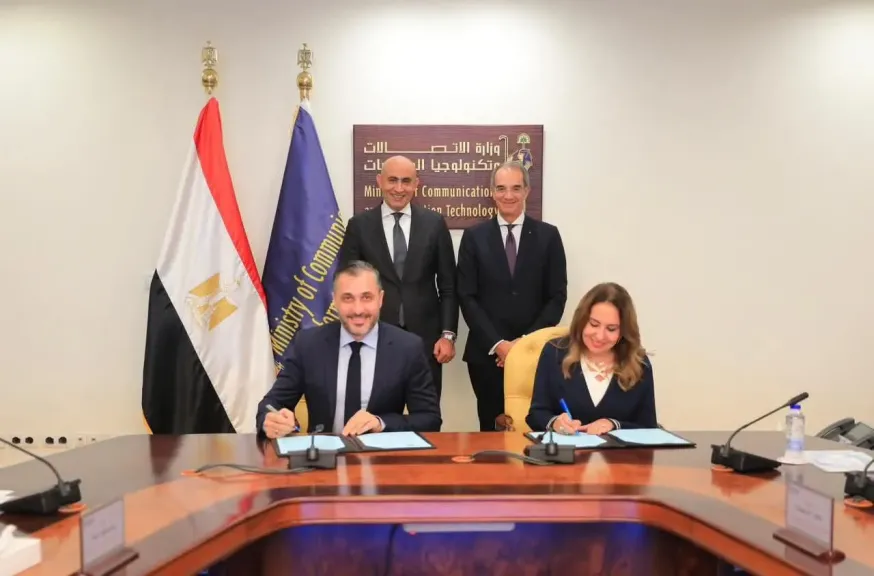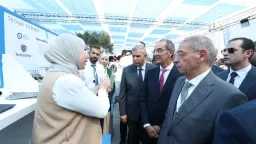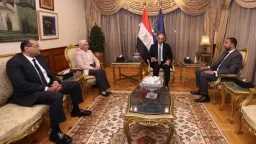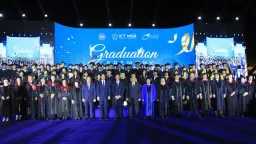ICT, Education Ministers Witness MoU Signing on Introducing HP IDEA into WE ATS

The Minister of Communications and Information Technology Amr Talaat and the Minister of Education and Technical Education Mohamed Abdel Latif have witnessed the signing of a Memorandum of Understanding (MoU) between the Ministry of Communications and Information Technology (MCIT) and HP Egypt on introducing the global HP Innovation and Digital Education Academy (HP IDEA) program into WE Applied Technology Schools (ATS) nationwide.
The MoU was signed by Vice ICT Minister for Institutional Development Ghada Labib, and Managing Director for the Middle East and East Africa at HP Peter Oganesean, in the presence of Managing Director and CEO of Telecom Egypt Tamer El Mahdi and Advisor to the ICT Minister for Technological Talents Development Hoda Baraka.
HP IDEA is a global educational initiative launched by HP to empower teachers with digital skills and enhance teaching methods through technology by supporting teachers in adopting innovative teaching practices and making education more interactive and effective.
The two-year MoU aims to equip teachers and school leaders at WE ATS in different governorates with the latest practices in digital education and innovation through the HP IDEA program. The schools will also be supported by providing relevant digital and educational tools to adopt modern curricula based on design thinking and learning for understanding. Additionally, participants will receive international certificates as HP IDEA Fellows and Associates.
The MoU also stipulates holding quarterly meetings between MCIT, HP, and Telecom Egypt to review progress and prepare regular evaluation and impact reports to measure outcomes and document development.
In his remarks, the ICT Minister emphasized that implementing the HP IDEA program in WE Schools reflects the government’s commitment to strengthening partnerships with the private sector to improve the quality of digital education and enhance schools’ readiness for digital transformation. This is achieved by integrating global best practices in teaching and learning methods while empowering teachers and students to acquire digital and innovation skills.
Talaat also pointed to the productive cooperation between MCIT and the Ministry of Education and Technical Education in launching WE ATS, starting with one school in each governorate, bringing the total number to 27 schools nationwide.
The ICT Minister highlighted that the second phase will be launched next year, targeting the expansion of new WE Schools, particularly in high-density governorates. He underscored that WE ATS represents a success story, and stressed the two ministries’ keenness to continue their efforts to sustain and build upon this success.
Talaat also underlined MCIT’s commitment to empowering WE School students to acquire future skills, develop their digital capabilities, and foster innovation within the framework of the Digital Egypt strategy.
The ICT Minister pointed out that cooperation with HP reinforces efforts to make WE ATS a model for technology-driven education by integrating Artificial Intelligence (AI), design thinking, and creativity into education.
For his part, Abdel Latif expressed his deep appreciation for signing the MCIT-HP MoU which aims to boost cooperation in advancing Egypt’s digital transformation and education development. He remarked that this partnership is part of efforts to revolutionize the education system, contributing to developing students’ digital learning skills and integrating programming and AI into school curricula.
The Minister of Education underscored that WE ATS represents a pioneering model in this regard, as its graduates have demonstrated excellence in the labor market and contributed to supporting the national economy and advancing digital transformation. He added that his ministry, in cooperation with MCIT, is currently expanding this successful model to include more schools.
Abdel Latif also explained that his ministry will implement new learning models that combine on-site and online education in line with modern global trends. He noted that first-year secondary students are studying programming and AI through Japan’s QUREO platform.
The Minister of Education added that learning programming remains the foundation of understanding AI, as it is impossible to comprehend the language of AI without mastering its rules. He emphasized that the goal is to prepare a generation of students capable of adapting to future jobs that have yet to be created.
Abdel Latif concluded his remarks by highlighting his ministry’s keenness to strengthen its collaboration with MCIT and HP, and continue the fruitful cooperation to advance education in Egypt.
Oganesean, for his part, said he was proud that HP is part of Egypt’s digital transformation journey. He commended the enabling environment for public-private partnerships (PPPs) that support the implementation of initiatives contributing to this journey.
Oganesean expressed his appreciation for the cooperation that enables the implementation of the HP IDEA program in Egypt. He noted that the initiative, launched five years ago, is part of HP's aim to empower 150 million individuals by 2030, with digital transformation in education through the program serving as a key means to achieve this goal.
It is worth noting that HP IDEA is built on academic projects developed by Harvard University, most notably Teaching for Understanding, Creating Communities of Innovation (CCI), and High-impact Practices. The program directly aligns with the United Nations Sustainable Development Goal 4 (Quality Education) as well as the Organisation for Economic Co-operation and Development’s (OECD) vision for the future of education. It also incorporates ethical AI principles, based on UNESCO’s guidance for the safe and innovative adoption of generative AI in education.
This cooperation represents a significant step in strengthening Egypt’s position as a regional leader in digital education and innovation. It also serves as a successful model of PPP, combining HP’s global expertise with Egypt’s national priorities in digital education, helping place Egypt among the leading countries in applying AI and digital pedagogy to empower teachers while advancing Egypt’s vision of building a digitally capable generation through sustainable, technology- and innovation-driven educational programs.
It is noteworthy that WE Schools were launched through cooperation between MCIT and the Ministry of Education and Technical Education as the first smart schools specialized in ICTs. Telecom Egypt manages and operates these schools, which aim to bridge the gap between theoretical education and actual labor market needs.














